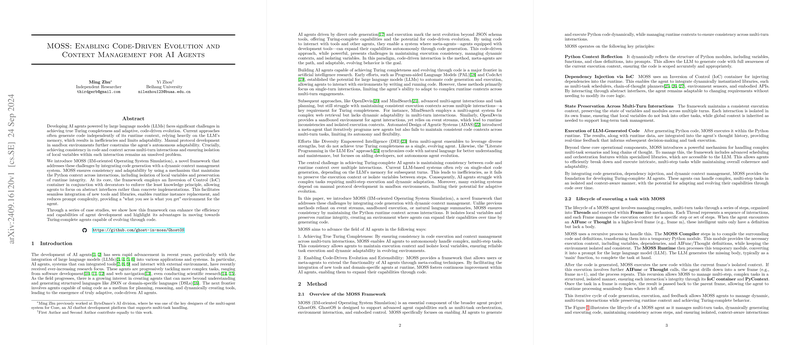Overview of "MOSS: Enabling Code-Driven Evolution and Context Management for AI Agents"
The paper "MOSS: Enabling Code-Driven Evolution and Context Management for AI Agents" presents a novel framework designed to overcome limitations in current approaches for developing AI agents powered by LLMs. The framework, titled MOSS (LLM-oriented Operating System Simulation), aims to ensure consistency and adaptability in AI agents by integrating code generation with dynamic context management. This enables the agents to achieve Turing completeness and evolve autonomously through code.
Context and Motivation
Existing methodologies in AI agent development suffer from inefficiencies due to the independent generation of code from its runtime context. These shortcomings are further exacerbated by the reliance on the LLM's memory and manual protocol development in sandbox environments. MOSS addresses these challenges by ensuring that code generation and execution maintain context consistency and adaptability across multi-turn interactions.
Key Contributions
The core contributions of MOSS can be summarized as follows:
- Context Management and Consistency: By maintaining the Python context across interactions, MOSS ensures the isolation of local variables and preservation of runtime integrity. This prevents leaks between tasks and maintains a consistent execution environment.
- Integration with IoC: MOSS employs an Inversion of Control (IoC) container to enforce a principle of least knowledge, enabling agents to interact with abstract interfaces rather than concrete implementations. This facilitates runtime instance replacement and reduces prompt complexity.
- Code-Driven Evolution: The framework provides mechanisms for AI agents to expand their capabilities autonomously through code generation. This approach supports the dynamic integration of new tools and libraries, enabling continuous improvement.
Methodology
Overview of the Framework
The MOSS framework is a part of GhostOS, designed to support complex agent capabilities such as multi-task orchestration and environment interaction. At its core, MOSS dynamically reflects Python module structures into prompts, uses dependency injection via IoC, preserves execution state across interactions, and executes LLM-generated code. This approach ensures that agents can handle complex, multi-step tasks in an isolated, context-aware manner.
Execution Lifecycle
The lifecycle involves managing tasks through a series of steps within Frames, akin to function call stack frames in programming languages. Each Frame operates in an isolated context, maintaining its dependencies and state. This recursion allows dynamic and context-consistent management of multi-turn interactions.
Case Studies
The paper includes detailed case studies demonstrating the practical applications of MOSS:
- Tool Creation: MOSS enables the creation and integration of new tools (e.g., a caching tool) through dynamic code manipulation using the ModuleEditor. This showcases the framework's capability to allow agents to autonomously edit and expand code.
- Asynchronous Multi-Task Management: MOSS can efficiently manage multiple file-editing tasks concurrently, leveraging the MultiTask library and demonstrating its powerful multi-tasking capabilities. Each task handles translating comments in a set of Python files asynchronously.
- Debugging in a Repository: The framework showcases its adaptability in debugging tasks by systematically localizing the root cause of issues in code repositories. The process involves detailed planning and execution through nested AIFuncs, highlighting MOSS's potential in complex software debugging scenarios.
Implications and Future Work
Practical Implications
The practical realization of MOSS allows for the development of more robust and adaptive AI agents. By focusing on code generation and execution within context-maintained environments, MOSS facilitates dynamic and evolving agent capabilities. This approach opens avenues for more sophisticated applications in software development, whereby agents can autonomously integrate new functionalities.
Theoretical Implications
Theoretically, MOSS advances the understanding of how AI agents can achieve Turing completeness through continuous context-aware code evolution. This framework stands to inspire subsequent methodologies that leverage the synergy between LLMs and dynamic context management frameworks.
Speculative Directions
Future developments could include enhancing thought units like AIFunc and Thought with advanced models like GPT-4 to exploit their strong chain-of-thought reasoning abilities. Additionally, integrating amplifiers and more robust frameworks could further augment problem-solving capabilities. Moreover, addressing security considerations by enhancing the safety of local execution environments remains a crucial area for ongoing research.
Conclusion
"MOSS: Enabling Code-Driven Evolution and Context Management for AI Agents" represents a significant step toward realizing adaptable and evolving AI agents capable of handling complex, multi-step tasks. By maintaining consistency and flexibility through integrated context management and code-driven interactions, MOSS provides a robust foundation for future AI research and development. The framework's practical applications and theoretical advancements position it as a valuable asset in the ongoing evolution of intelligent agent systems.
